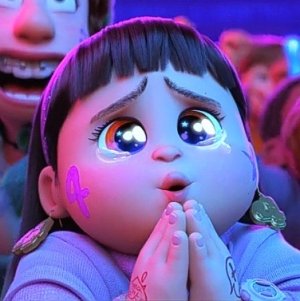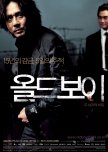
That's Chan-wook's little insert right there. The original manga that Oldboy is loosely based on isn't as grim as this adaptation. The film was dark and an powerful revenge story with one of the best plot twists ever. (Sadly, I have known the plot twist even before watching the film but it didn't take away the effectiveness of the reveal.) Dae-su is a grimier version of the original manga's lead which complements the story and the revenge so much more. It is brutal and filled with madness just like Dae-su himself. Chan-wook knows how to keep his cards, as if a knife is as the edge of your throat until he carefully laid each one out.
For a dark film with dark overtones and gritty visuals, the use of music contrasts the overall aesthetics. Playing Vivald's Four Seasons is a great way to bring out the mayhem and intensity of the film especially during action scenes filled with dramatic build-up. The cinematography reminds me of Netsuya Nakashima's The World of Kanako. While Oldboy doesn't use the same fast-crazy-cuts, it still does it during intense scenes which heightens the suspense.
My favorite scene is the corridor fight scene which was taken in one go. Definitely felt natural and real. Choi Min-sik is great as Dae-su so as Yoo Ji-tae (who is also in Memories of Murder) which serves as Dae-su's contrast both in appearance and personality. I'm not sure if it's intentional in Chan-wook's behalf but the great use of Oedipus Rex (best if you're familiar with it) just amazing it setting out the story and characters.
Oldboy deserves the praise it gets and the hype it has. It strips its characters bare and lays out their deepest and darkness parts but never tells you to hate or love them, instead you as a viewer, make that decision. It shows rawness and boldness just like how its story goes.
Was this review helpful to you?
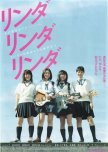
See, I do play the guitar and the piano (and used to sing as well), but Linda Linda Linda is more of classic Japanese rock than my usual, or at least what I've grown up with. So I couldn't connect with that aspect. But I still absolutely love the simpleness of the film and the fact that it doesn't try too hard.
Nobuhiro Yamashita uses tracking shots as if to show the growth and progress of the characters. He also knows how to contrast them especially when all the four leads are in one frame. The cuts are long as if the camera just keeps rolling as they're all just acting naturally. That's Linda Linda Linda. Watching it just feel so...natural. So relaxing and at the same time, full of energy.
Bae Donna (who starred in many Hollywood films including Cloud Atlas) shows alienation well but not in the way that will make you pity her. She carries it in a simple natural yet. Aki Maeda, Yuu Kashii and Shiroki Sekine (bassist of Base Ball Bears, whose songs were part of the soundtrack) have such good chemistry on screen, each with their own unique personality that compliments each other.
Well, at least you have a lovely soundtrack to enjoy. Blue Heart's Linda Linda is going to give you Last Song Syndrome (just like it did for me).
Linda Linda Linda is a simple high school tale of friendship. (No drama, no heavy crying). So it doesn't need to be too much to be compelling. If you want something light and at the same time, fun, this is a good one.
Was this review helpful to you?
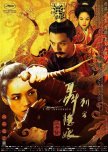
Instead, it is more for those who want to see a film and appreciate cinema as an art form. Hsiao-Hsein makes use of cinematic beauty to tell his story which is loosely based on the 9th century story, Nie Yinniang. It's a turtle's pace story that drags its viewer on. With long cuts to wide angles to old school panning, Hsiao-Hsein channels in traditional storytelling. There is a lot of ambiance shots, little dialogues and more expression to move the story forward. As a viewer, you focus on the cinematic beauty. It's a cinematic ballad of Asian context.
True enough, it might be difficult for people to follow the plot. The summary might even be misleading because I see no romance here. Instead, I see more of an exploration of one's identity but perhaps a little too less. The lack of dialogue is overshadowed by the overwhelming amount of wide setting shots that makes you, the viewer decide most of what happens. There is little close-up of characters so you are in total control when it comes to interpretation.
The Assassin's strongest feat is definitely it's visual allure that explores the power of stillness (through the cinematography) and silence (through the lack of dialogue and use of music) that brings an unease tension, excitement and anticipation. It's almost as if you're watching a poetic piece, embedded in mystery all the while embodying precise movements and careful gestures that speaks to the camera. The lack of dialogues amplifies the action creating literature-like atmosphere.
Shu Qi reminds me of Chinese actress Zhang Ziyi, her movements are so graceful and full of clarity. Her stone-cold face and unstained expressions just captures the assassin role so well. Hsiao-Hsien won Best Director in Cannes for this film and also swept 8/9 awards in the Asian Film Awards among others. In the end, it's really the ice-pole pace and the uninteresting characters that'll make you keep it at arm's length.
Was this review helpful to you?

Inspired by true events (although fictionalized a little bit) by the Sugamo Child Abandonment Case, Koreeda presents an euphemized, less grim telling of the true events. It's a melodrama that's not depicted as a melodrama but carries the same intense and impact. I absolutely loved this film from the start to finish. Koreeda channels a contemplative style where details, time and dialogue drives the storytelling forward through its characters' actions. He maximizes the potential of his actors because it's presented in a way that's not exaggerated, not hyperbolic and not overly dramatic despite the film's central theme and plot.
I absolutely loved this film no doubt. Koreeda shows the passage of time through precise details from close-ups of feet, hands, tearing away of nail-polish, changing of the hair, color of the clothes and so on. That little Tokyo apartment depicts all the passage of time. The long cuts and the sudden shots of the children all show raw vividness and sincerity, it's as if they are being shot in their natural state which is how Koreeda really wanted it. The bond and the chemistry between all four children speaks volume and makes their presence feel very sentimental.
All four actors have zero acting experience prior to this film and you know what? That doesn't matter because it just feels so natural and so real that it doesn't matter. Young Yuki is just adorable. Shigeru though crazy is just cheerful. Kyoko is just simple and big brother Akira exhibits a boy-beyond-his-years. You see how the children change through their eyes and it's a very different perspective given to us as audience. The limited presence of adults did not matter because the young ensemble dominated the film well enough. Despite the serious subject, you cannot help but hate the mother (played by J-Pop star, YOU which IMO is a good choice) because each time she's on screen, she's shown as a bubbly, lovable mother. YOU's acting of a mother that craves love, somehow childish and the shots of putting on make-up all show that she craves the carefree life. But you can't hate her for that and Koreeda does that well. He also doesn't make you feel pity for the children instead he makes you admire them. These are all channeling positive emotions yet it's not a make-good film, it's a poignant coming-of-age portrayal.
Yuya Yagira, only 12 when he made this film, won Best Actor at Cannes at 14 for his role in this film beating famous names like Tom Hanks and being one of the youngest actor to win the award plus the first Japanese to do so. And he deserves it. Yagira acts with his eyes. He keeps the same all stoic face even when he's angry, when he's tired or when he just wants to run away from it all. He keeps the face. But it's the eyes that does the acting. He exhibits a maturity that's trapped in a child's body. A role where one is forced to grow up is shown so well through the children's little desire of toys, of games, to time outside of that cramp apartment, of friends, of baseball - these are all little details that Koreeda, the children and Yagira depict with intense vibrancy. Yagira is the anchor of this film showing such an emotionally complex portrayal of Akira.
The aesthetics of this film is just so nostalgic. Despite the very melodramatic theme, it doesn't feel grim or sorrowful so as a viewer, you feel hopeful. It's just so light that you can't help but feel good. With the in-depth use of camera, you are in there with them sharing their secret and you are helpless to do anything. Everything is overwhelming. But it's the overwhelming that makes you feel helpless as a viewer. This is great engagement between you and the film.
Koreeda uses symbolism, foreshdowing recurring shots that drives storytelling forward and perfect example of "Show Don't Tell"; is channeled throughout the film and it just touches you. I can't remember how many times I smiled seeing the same details used again and again to drive the story. For example, the opening shot shows Akira touching a pink suitcase, when the family moves in to the apartment, Shigeru is in that suitcase (I'll skip explaining why as to not spoil so much) and that very suitcase is used for a crucial plot element in the final half of the film.
Recurring use of a pink nail polish as well to show the mother's desire for youth and freedom and love and how Kyoko dropped it (another symbolism) and how the mother tried to wipe the stain (another symbolism) and how Kyoko is touching the stain months after the mother leaves (another symbolism) and the fading away of the nail polish shows the passage of time. It's repetition and making use of details so precise that makes the presentation of destruction of this family look so good and so beautiful and so clean even when it shouldn't be. Koreeda knocks you off your feet even when he doesn't have to try too hard.
Nobody Knows is not a film that's suppose to make you pity these kids (the ending is open-ended in some way) but it's a raw and vivid portrayal of family, of togetherness and of love and of courage shown through little details and utmost simplicity.
Was this review helpful to you?
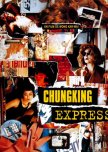
Written during the day and shot by night is impressive and makes the film an exciting one that adds to Kar-Wai's pool of Asian work. While not his opus, Chungking Express is fascinating on its own. It's a film that's not plot driven but rather pulled and told by jarring cinematography, takeaway-meals and serendipitous tales.
An exotic bright colors and cinematography that's a combination of cris-cross, fast-moving shots that seems like a huge powder of euphoria has been splashed all over the screen. It's not your-typical-romance. It's more about storytelling, dialogue and narrative that's shown through the visuals that allures you.
It's the shakey cameras, the close-ups and the movements that guide you as you want. It's cinematic freedom that speaks pure Kar-Wai style of emotionally resonating narrative, visual uniqueness and stylized touch.
This is a intertwining stories of two cops, both of which are getting over a heartbreak on their own ways yet are told in similar ways through the use of visuals and small references and even candid symbolism that reflect Kar-Wai's poetic storytelling. It's really the second story that shows more of Kar-Wai masterpiece with cinematic sequences, engaging dialogues and great contrast and after effects. It's the little details of slow-motions or Faye's dancing in no. 663's apartment that pulls the cinematographic storytelling forward.
As such Chungking Express just like Kar-Wai's films about love is showing that love-can't really be described. No words. Instead, he shows it through visuals and details and such. This makes the film pure, not romanticized and a alluring ode to Asian cinema.
Was this review helpful to you?
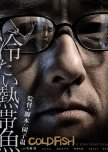
He opens the film with fast cuts paired with marching music that immediately sets the tone and the setting. The plot develops not through the revelations (the cliche way) but through dialogues, action and small details wrapped around in one perfect blanket. The clever way of using music that contradicts the scene is very Sono style but nevertheless, effective in bringing out the scene.
Dark, gray tones dominate the film with lots of red. Still, tropes like the typical-weak-salary man is still played and stretched towards the end that somehow makes the film repetitive. And with a 140 minutes running time, it's too long for a crime-thriller drama of this sort. The pacing is just too long, the narrative too dragging that at times, you just want to get to the excitement (and they aren't many). Expect blood and guts but don't expect excitement. Expect weirdness and undermined representations of women but don't expect excitement.
I'd praise the actors for their excellent portrayal though. Veteran actor, Denden plays the energetic-everyone's-uncle role so well mixed with humor and sadistic tendencies. Asuka Kurosawa (whom I've seen play a similar role in The World of Kanako) plays the seductive wife well and Mitsuru Fukikoshi plays the pathetic average man so well and that transformation at the end. Silent but deadly. He played it well.
It's more disturbing that the film is loosely based on the "Saitama murder of dog lovers" as you watch the film and have that in mind (though Sono makes a point that it's based on a true story in the beginning), it helps to establish the "credibility" and "sincerity" of what you're actually watching rather than just a make-believe murder tale because murder can be overrated.
Was this review helpful to you?
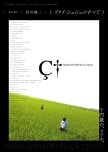
With such a long running time, it's difficult to wrap my head around what I feel about this film. It's also my first Shunji Iwai film (and it wouldn't be the last). Iwai, cinematographer, Noboru Shinoda and music director, Takeshi Kobayashi are able to beautifully portray something so brutal through the colors, the shots and the music. That's cruel. You see something so terrible happening in front of you but you're so mesmerized because it's done so beautifully. They romanticized teenage angst so well.
The plot is simple and it doesn't try too hard. The narration is easy to follow despite it not being linear...it makes you more intrigued to watch. But perhaps a problem lies with the plot's simplicity yet carries an almost riddle-like script writing with its overwrought and difficult-to-decipher black screen, white text repetitions. It's poetic but together it's words that don't make sense... generally to just normal watchers. (What is Lily's Ether????) It's trying to be philosophical in a coming-of-age film which in one hand, captures this change but at the same time, leaves you baffled and scratching your hand. There's just a lot of vagueness, a lot of interpretation (You decide the identity of those posting in the board too) of you to do that it creates a miscommunication between director and audience in the expense of telling his characters' stories.
We have an amazing pool of young characters that drive the story forward with Shugo Oshinari whom I think has the most interesting character. It seems like he underwent some kind of ephiphany (though not really in a good way) during a trip to Okinawa and just...changes. Just snaps. Kikeru - sudden fits of rage. It's interesting but at the same time the "why" isn't explored. Or maybe it doesn't matter. Maybe it's not the why but the what.
Hayato Ichihara is your typical wimpy loner that allows himself to be bullied. It's pathetic and not fun to watch. You don't feel bad but Ichihara plays his character like he doesn't want you to pity him...instead he wants you to slap him awake. I think that is engagement with the audience. For a film with such a simple plot and long running time, we need that.
And again, cinematography is just great. The colors are bright and crisp. The setting is in Ashikaga in the Tochigi Prefecture and the film captures the setting (not in the hussle and bustle of busy Tokyo) so well and it just perfectly wraps itself in the context of the film.
Most of the scenes are shot probably using a lightweight camera especially in the Okinawa scenes with shaky shots and hand-held shots. This is to establish a sense of connection with the audience...as if you're watching a home video. It's effective (and profanely beautiful) but it could be too much in a 160 minutes run. The music is superb, sang by fictional-idol Lily Chou-Chou (Salyu in real life) and it reflects the mystic and visual allure of the film.
I think that this film has some underlying social commentary to it. A film that's full of mystic and vague messages. Is it simply to show the extreme lengths of youth violence that is fueled by teenage angst which would cause bewilderment especially in a society such as Japan's? A society that boasts of politeness (highlighted in the film too), of social order, or discipline, of stability and of staying true to its norms and roots? Is there a place for rebellious teenagers? What about worshiping an idol to the point that you believe her songs exists even in the normal realms of reality? Idol-worshiping and virtual reality and to an extent, escapism are big things in Japanese society. Does the internet offer refuge from the horros of the reality especially in that kind of society?
Like one commentator said, "Lily Chou-chou is just human." Or is this film simply to show human life as what it is? Iwai's message is simple but it's up to you to decide what's your take on it.
Finally, if you're expecting a satisfying conclusion after watching so long. Don't. That too, is up to you. This film isn't for everyone. So if you can sit for 160 minutes and watch a romanticized story of teenage angst then this is for you. Or if you want to think about life...this might be for you too. In the end, it's the way the story was told through amazing visuals that got me. It's a powerful, haunting and honest coming-of-age film.
Was this review helpful to you?
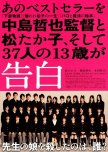
This review may contain spoilers
Well, it made the final shortlist in the Best Foreign Film category of the 83rd Academy Awards for a reason. From Kamikaze Girls and The World of Kanako director, Tetsuya Nakashima, Confessions is considered his opus. And with good reasons. This is based on the thriller novel by Kanae Minato.With a strong 20 minutes opening monologue, Confession quickly establishes itself. It sets up the scene, introduces characters and creates conflict within 20 minutes with elaborate control and pristine intrigue. It's not perfect. It's not as detailed or as convincing especially actions coming from mere junior high school students but it enters a new type of fascination as a viewer. While the immoral practices presented in the film will make you question, it delivers the shock factor it needs. Perhaps the reason why it chooses that age group as its major protagonist (or should I say, antiheroes).
Confessions is a revenge thriller that is cleverly wrapped into a psychological film. Yes, the actions will cause shock (perhaps not even for the lighthearted) but it's the mental manipulation, the monotone, the poker face and the polite words that Moriguchi (played by Takako Matsu) that makes everything a perfect blow, up until the end, almost pulling a perfect Chekhov's gun.
While the intertwining confessions benefit viewers in giving a different perspective and a two-side of the story narration, it suffers from inconsistency especially in terms of clarity and length. Given the context of the story though, it makes you question how plausible the writing is. You can applaud Moriguchi's clever plotting but you question just how much, especially having junior high school kids here, how of much of what happens makes sense...in reality (being vague to avoid spoilers).
A contrast in terms of style with Nakashima's The World of Kanako which incorporates fast cuts and heightened overtones, Confessions is slow, filled with slow motions that adds dramatic effect but renders the stab to the heart effect. Irony and contrast is a recurring theme. Lots of irony. Contrast in overall cinematography with dark colors against white background reflect the melo-dramatic feel, sometimes emo ballad curled in psychological mindfuck that the film tries to take. Lots of dark gray tones creating a gloomy ambiance. Contrast with English music with ironic lyrics and dramatic scenes make the scenes stand out.
Ai Hashimoto, often called as an acting prodigy because of the massive pool of films under her belt at the age of 20 puts on her signature smug look that shows a character filled with secrecy. Yukito Nishii executes his character well, playing an innocent genius with dark secrets. His actions surprised me and I least expected that. He has great chemistry onscreen with Hashimoto. It's probably mean to say but Kaoru Fujiwara fits the stereotypical wimpy loner look which makes his acting effective and his eventual collapse all the more heartbreaking.
Overall, Confessions is not a perfect film but the acclaim it gets is the way it handles the psychological factors it imposes on its viewers. It tries to ask you teach you a lesson about life, but actually you don't need that lesson. That's a red herring in the film. Everything it "tries" to tell you, you already know. And I think the film is just showing these underlying "lessons" out in the open using young teenagers for elaborated effect. It's not a film about evil per say but the little hidden dark side in all of us. But I'm just glad that it wasn't the least bit romanticized.
Was this review helpful to you?
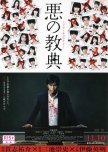
All of Miike's films that I've watched are based of a manga or novel. Lessons of the Evil is based on a novel by Yusuke Kishi who also wrote Shinsekai Yori (From the New World, and the anime is so good) so I expected a well-off adaptation. Instead I get something that tired me out for two hours with not much value. We just get another sociopath of the loose and to be honest, I'm tired of using that card. We know about them and they fascinate us yet we don't really see another interesting side to them.
What is Harasumi's driving force? Or does he, as a sociopath not have any? It's a character with no backbone. We get a history but it doesn't have substance. Same goes for the many other minor characters. We know them and they get a bit of spotlight yet they're just chopped off once they serve their purpose, it's almost irritating to have a bunch of characters.
Miike has always been an unpredictable director that swims with violence and murder as themes in his movies. You can never know who dies and lives and I guess that's something that at least keeps this movie intriguing for me. The use of cheesy and jazz music and ironic props is another. It's a great contrast with the overall theme of the film.
I'm just so disappointed that Sometani and Nikaido's screen time are so short, they didn't get to shine as the amazing actors they are that much. (But they really have good chemistry together...not romantically but on screen, they complement each other). I mean, Sometani has this face on. But it's a face that's distinct no matter what genre the movie is. And Nikaido always pulls of her characters with a sense of strength even if the situation says otherwise...but here, they didn't give her that. Where is the innocent face that has this secrecy that makes her scary and amazing to watch? This isn't here and her presence here is so little it doesn't give her credit. Surely, it's a change but it's not a good one. (But okay fine, she's not the main here anyway...)
There's an amazing pool of young actors here. They could've been given more screen time. But I get it, two hours is already long enough. First hour is all about build-up and then the last 30-45 minutes is Harasumi's execution of God's Will (although honestly, I'm sick and tired of using that same trope). That's why it's not as entertaining as I hope it to be because of the slow pace and a sudden overwhelming pace towards the end that uses the same elements.
Of course, Hideaki pulls of his character well. And he should since 2 hours of the film is devoted to him and everything he does (ironically, we know nothing much about him). He has a presence and charm that makes this role perfect for him.
Cinematography wise, Miike makes use of details. Compared to his other films, I think he actually held back with this a little when it comes to gore. Sure, you see blood everywhere but it's not actually highlighted that much. I also like the change when it comes to colors (just like his take on As Gods Will), there's at least a combination of light and grimness that matches the overall context of the film.
But in the end, it's just done sloppy and repetitive killing of the innocents. What does the film want us to take home after watching it? That's the ultimate question mark. Some films scare us, some make us cry, some entertain us...I don't know what Lesson of the Evil's purpose is.
Was this review helpful to you?

If you're looking for entertainment at face value then Why Don't You Play in Hell is for you, compared with Sono's other psychological films like Himizu or epic, Love Exposure. WDPH is full of pleasure. It's an action-comedy guerrilla style, sometimes a teenage love story, sometimes a violent off-with-the-head shot or sometimes just...whatever. And that's totally okay. If it doesn't make sense, if it can't be explained, that's okay. WDPH is just that. It's a mish-mash of things that's suppose to be entertaining for everyone. Action, comedy, love story, friendship..yada, yada.
I especially love how all the sub-plots and story line just come in together and blend in towards the later part of the film. First, a yazuka story. Then, a rebellious young adult who meets a man that has loved her...for 10 year after seeing her in a commercial. Then an amateur-yet-passionate film crew that just wants to make the movie of the century. And all these story lines come in because of one thing: film. And here you are, watching a film too. Film-ception?
Everyone here is great. Angry, sad, crazy, all these emotions portrayed by the actors were great. Some of them I'm seeing the first time on screen. Everyone has such good chemistry, you can't really hate anyone...even with all the killing and blood. It's just so hilarious how Sono combines all the blood with comedy, all the killing and still make it feel so...light and heavy at the same time. The thing is, as you watch, you're always in for a surprise. You'll never know what to expect because of this mish-mash and unorthodox style. That's what's going to keep you hanging.
A slight comment on Fumi Nikaido. This is the third film that I've seen her in and yet again, she proves how much of a versatile actress (who got nominated for her performance here in the Asian Film Awards) she is. Heavy drama in Himizu, forbidden love in My Man and now a rebellious fighter. But she still keeps her signature acting that I totally love: that secrecy in her eyes that actually makes her scary (and very fun to watch).
Cinematography, sound and mere 35mm comparisons to digital is tackled and very much in sync with the overall film. If I can describe WDYPH, it's creatively entertaining. This is probably Sono's ode to Asian cinema and proves just how much amazing it can be.
Was this review helpful to you?

This film is not for everyone. If you're looking to be entertained, don't expect. It's an emotional roller coaster of a mindfuck, for the lack of a better word. It's a dark coming-of-age story. Not your wishy-washy type. It's just keeps driving down and down and down. (But does have a light at the end of the tunnel.) For a 2-hour feature of violence, madness and despair, it's an exhausting watch. One that drags on and on and on and you just want to put these characters out of their misery. But Sono captures these daily struggles with graphic scenes, staggering images and in-your-throat drama that sometimes seem to hyperbolic for your own taste. But effective in delivering the message.
It's a film about the youth. About brokenness. About a bleak future. Although it depicts a rather negative image of Japan and the burden of the youth to paint a future for the emotionally broken adults even if that future is bleak. This negativity is meant to allow viewers to reflect a broken system. Sono's symbolism, repetitive images, long cuts and foreshadowing makes for a masterful play on this rather dark and tragic tale. The music/soundtrack is playful. It's flirts with the cinematography and blends in so well. The low sounds echo that of the tragic story and the catastrophe left by the March 2011 incident. This is a tragedy. Even the bubbly, laughing Keiko (played by Fumi Nikaido) is also dragged into the hellhole.
Shota Sometani (husband of Academy Award Best Supporting Actress nominee, Rinko Kikuchi who is 10 years his senior) and Fumi Nikaido (both have also worked in other films together before and after this one; hence, the undeniable chemistry between the two) are versatile and experienced actors show why they deserve their Marcello Mastroianni Award. Sometani 's performance as a angst-ridden Sumida is a tour de force. It's difficult to believe he plays a 14-year-old character. It's sickening and pitiful as much as it's admirable to watch him. Despite keeping a stone face, it's acting that's not dead fish. The screaming, the mere falling down, the rolling in dirt, the crying in the rain, it's all delivered with such extreme clarity. Nikaido is amazing as well. But like what I said about her in "My Man", she has this innocence that's scary and I also feel that here. But she adds an edge to her acting, there is more tears and that actually complements Sometani's "zombie" character.
The underlying social commentary about a sickness prevalent in society is the film's most important giveaway.
It's the desire of youth, seen as the hope for the future to do good. Even if they can't do good for themselves, they'll do it for society because that's what we're expected to do right? Adults mess it up and we have to find ways to fix it. Adults run away and we have to solve it even if we ourselves also want to run away. That's what Sumida is truly running away from. That's why he wants to be ordinary. That's why he just wants to be normal.
I know this is not a romance but Sumida's bleakness is complemented by Keiko's optimstic nature even if her love is a masochistic, almost obessessive one, there's still a tinge of light in it as she pushes Sumida forward. A distorted version of a manic-pixie dreamgirl you could say.
But as such, it luads more instead, to be hopeful. As Sumida shouts, "Don't give up!" Have a dream!" Yes, it's portrayed tragically, the entirety of the film is but it also provides you a resolution at the end. Thus, this film being Dylan Storm's favorite (taking a line from it to justify his action) misses the take and point that it wants to deliver.
P.S. The recitation of Villon's "Ballade" of the characters is perfect. Of course, the whole poem isn't recited but it carries a meaning that the film has. It's even said by one of the characters. "I know everything but myself." For a film about loss, future and tragedy, it's difficult to find who you really are at the end of the day. Or if you ever will.
Was this review helpful to you?
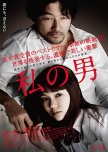
If you think Vladimi Nabokov's "Lolita" was difficult to stomach or Stanley Kubrick's film adaptation was daring enough at the time it was released...well, expect My Man to level that up. With not only touches and kisses but straightforward intimate, sexual scenes between Nikaido and Asano will probably leave you disgusted, angry or just pure disturbed. But that's probably Kumakiri's goal. It's not the dialogue that will make you feel the emotions rather it's the actions with dripping rains of blood that symbolize this forbidden passion.
A lot of watchers compare this with The World of Kanako (which Nikaido also played a part) but I tell you, this is nothing like Kawaki. If Kawaki is fast-paced and overwhelming, My Man is slow-paced, ant-climatic yet its in the actors' performances that pulls you in and pulls the story in. Kumakiri omits a lot of explanation, how the characters feel, what they think, what others think, etc. which gives us, as viewers freedom yet it could also cause confusion especially in a film that explores such a story.
There are some foreshadowing, some repetition and more importantly, contrast. A lot of it. That's what makes each character stand out and it snowballs the plot (a good sentiment as the film is set in Hokkaido, the coldest region in Japan, expect to see lots of snow here). That setting makes you feel colder towards these characters (instead of warm) and it creates that distance to feel sympathize for Nikaido and Asano's relationship even as their characters start to descent into chaos and madness.
Nikaido as Hana is amazing (I mean she's only 1 year and 1 day older me and her boldness with this role). She deserves to be the "It" dramatic actress to watch out for (I heard she is amazing in Himizu as well, which I will watch after this!). She has this ability to portray a bubbly, energetic schoolgirl that LOOKS innocent yet holds deep secrecy (of the forbidden relationship and a traumatic past) and in some way, that makes her scary. And effective as an actress. She is able to portray Hana's deterioration because of this relationship not verbally but emotionally. Later on, she becomes a independent woman yet holds a sense of distant and quiet destruction inside of her but not with such a dull expression rather with the eyes. She carries herself and not let her older co-actors do that.
Asano works well with Nikaido (weird to say that but yes). He doesn't provide Jungo's character with anger or destructive features. Yet he also doesn't soften his character, through his actions we hate him. Through them, we don't feel bad at his dismay yet we can't utterly hate him because Asano doesn't make Jungo hate-able. In some ways, Nikaido's Hana carries his character as he becomes dependent on her yet Nikaido's performance blends in well with his.
This movie is not for everyone, definitely. Yes, it can be disturbing and not an easy watch and definitely twisted. But it's also such films that portray things that happen in society especially those who went through so much (whether it's right or wrong is up for debate and up to you). Though, if you expect a conclusion, don't. It seems that Asian films don't really have a solid one. Instead, focus on the journey of these two.
Was this review helpful to you?
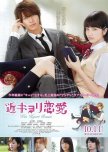
I've seen Yamapi in his latest drama, From 5 to 9 and I wanted to see his acting abilities. But just like his character in that drama, Yamapi feels like a #deadfisheye actor. (I read in a Psycho-Drama article, there's agood analysis of his acting in his other works there as well.) He is good-looking, yes. (And his character in that drama requires for him to have that type of acting but after seeing it here too...) And he has the charisma but his acting just doesn't feel real.
Nana Komatsu on the other hand basically swept him under the rug. I've just seen her in The World of Kanako and she is amazing. Her character here is suppose to the one who puts on the ultimate poker face (which she is able to do really well by the way) and Yamapi is suppose to be the one to complement that character by contrasting with her, yet he probably chooses to have a poker face/deadfisheye battle with her.
Plot wise, it's nothing new. Teacher-student relationships are common in anime and manga. Is it done right here? Well, I can't say for sure. I just think that there's not enough development and scene for the two to make their relationship and feelings believable or sincere. Yes, they have chemistry. But it just lacks the development for it to feel like it's done right. We also don't know why Komatsu's character is the way she is. And why Sensei chooses to give her private lessons. There are a lot of gaps here which is why I truly didn't have much of the *doki doki* feelings.
Side note: Also technically, even if Komatsu's character is 18 years old (the legal age in most countries), you're considered an adult at 20 in Japan and they even have a ceremony for it.
Was this review helpful to you?
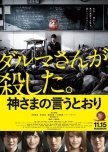
Truth be told I did watch this because of Fukushi Sota, although it has an interesting and intriguing story. Japanese films are known for either its love stories, action and horror. Well, As the Gods Will being based on a manga, surprisingly is quite refreshing. Although the initial concept of teenagers fighting against each other for survival isn't new (Battle Royale/The Hunger Games), the idea of using children's games as a mean for the plot to take place is interesting and ironic at the same time.
While the movie has its fair share of gripping scenes, sometimes so violent that I had to avert my eyes, it's still one of the those films that have its typical tropes. Exhibit A: that one sadistic student that everyone should be wary of. Some cheesy out-of-nowhere lined romance (I get the purpose but really though...) and the fact that there wasn't much background to begin with left the story hanging, though it makes everything open-ended. I did love how it also took some risks...that surprised me.
As for the characters...they lack depth. I know it's a survival movie and we don't have time for that but in order to root for someone or at least feel a connection with the people who are fighting to live, we must at least get to know them. Fukushi Sota is such an eye-candy but his acting is still so mediocre. I did think that the actor who played the sadistic student was better. The CGI was okay...wasn't top-notch but wasn't too bad as well.
All in all, I think it's still an entertaining watch.
Was this review helpful to you?
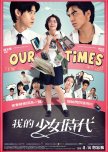
This review may contain spoilers
Asian teenage rom-com starter pack:1) not-so-good-looking female lead
2) bad boy male lead
3) beauty transformation
4) some type of bet
5) bet backfires and the two leads fall in love
6) but they don't know how the other feel
7) love triangle (usually with a more good-looking character)
8) "make the best of our youth"
9) follows a time line
10) first love = endgame
Bonus 11) The actors are going to become household names after...
Number 10 is really the reason why I kept coming back. I just have the awful attachment to those kinds of stories and just makes me believe in them more...even if the chance that they'll happen in reality is slim. But anyway, the point is: teenage Asian rom-coms follow this similar path. Of course, there's some changes here and there but the initial idea remains and Our Times is no exception. It likens with another Taiwanese hit, You're the Apple of My Eye and Thai hit, Crazy Little Thing Called Love.
Yet I enjoyed watching all three. Why? Because of the nostalgia. (And yes, I'm weakness in these type of plots.) Thing is, these type of movies, like Our Times is of course, not for everyone. It has its target audience and I guess it's able to reach them successfully. All these movies I mentioned, including Our Times tries to tickle a millennial's nostalgic heartstrings which is really a big thing in Asia. You feel it alongside the movie, that is why timelines work.
And Our Times used that. Cameos by well-known actors like (no spoilers allowed so...) made that feeling stronger since many of us young adults, grew up watching them.
With that, we are able to remember our own first loves. Not to mention that Our Times has beautiful cinematography and soundtrack. The plot is nothing new but the comedy is still spot-on. Darren Wang and Vivian Sung (both in their early 20s by the way) play their respective characters well. I do think that Our Times, however, tried to twist things a little to make it a little more interesting (though still relaying on common romance tropes) but still trying to stretch things a little.
In the end, it's not a movie for everyone. But for those it wants to reach, I believe it does. It's a fun, light-hearted watch that tries its best to deliver a message for us youngsters out there.
Was this review helpful to you?

